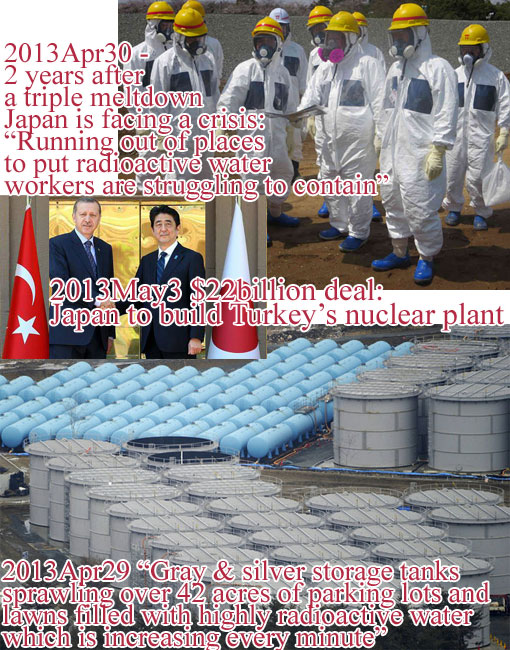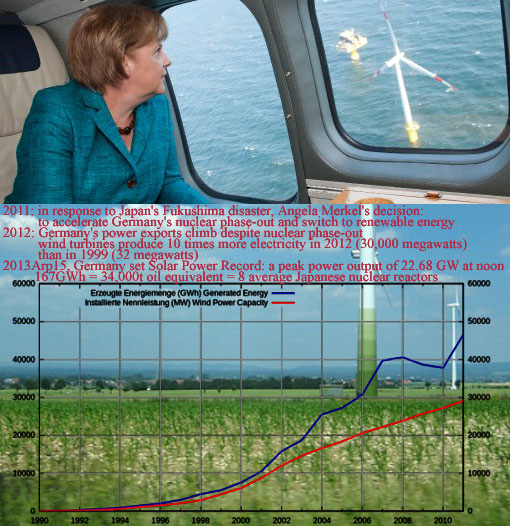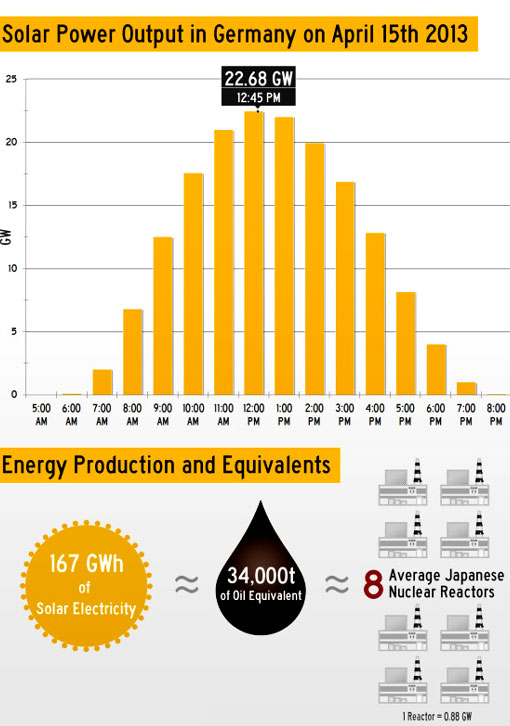You are hereBlogs / WcP.Observer's blog / Fr wwii...: Germany, nuclear phase-out; Japan, radioactive water out of control, nuclear plan unsettles US, $22bn deal w/Turkey
Fr wwii...: Germany, nuclear phase-out; Japan, radioactive water out of control, nuclear plan unsettles US, $22bn deal w/Turkey



(quote)
24 May 2013 - Japan must continue efforts to deactivate Fukushima nuclear plant – UN agency
30 April 2013 - In Japan: Running Out Of Places To Put Radioactive Water
30 April 2013 - Flow of Tainted Water Is Latest Crisis at Japan Nuclear Plant
Japan's Nuclear Plan Unsettles U.S. - Japan is preparing to start up a massive nuclear-fuel reprocessing plant over the objections of the Obama administration, which fears the move may stoke a broader race for nuclear technologies and even weapons in North Asia and the Middle East. The Rokkasho reprocessing facility, based in Japan's northern Aomori prefecture, is capable of producing nine tons of weapons-usable plutonium annually, said Japanese officials and nuclear-industry experts, enough to build as many as 2,000 bombs…even as just two of Japan's 50 power reactors are running because of the safety concerns raised by the 2011 Fukushima nuclear accident... A second U.S. concern has to do with the security of Japan's plutonium stockpile. Given that the country has drastically reduced the number of operating reactors that could burn plutonium-based fuels to produce electricity, the excess plutonium would have to be stored. Rokkasho has been seen as a facility that will allow Tokyo to reduce radioactive wastes from its nuclear power plants by reprocessing spent nuclear fuel. Japan's government and private companies have invested more than $21 billion in the Rokkasho facility since its construction began in 1992. The startup of the plant, however, has been delayed 19 times because of technical and financial problems, said Japanese officials…”there wasn't any real need to focus on [Rokkasho]," said Gary Samore. The Rokkasho reprocessing facility in northern Honshu can produce nine tonnes of weapons-grade plutonium annually, or enough to construct up to 2,000 bombs. "Japan to acquire large amounts of plutonium without clear prospects for a plutonium-use plan"?
'A very fragile situation': Leaks from Japan's wrecked nuke plant raise fears
Not in Turkey – Japan has recovered from the 2011 Fukushima disaster (?)
Japan, Turkey sign $22bn nuclear deal Japan and Turkey on Friday signed a long-awaited deal to build a major nuclear power plant on Turkey’s Black Sea coast, a milestone for the Japanese nuclear industry as "it recovers from the 2011 Fukushima disaster".
Germany
Germany's 2012 power exports climb despite nuclear phase-out: In response to Japan's Fukushima disaster, Germany passed legislation leading to the closure of eight nuclear plants at a time when wind and solar power could not provide a reliable source of energy to plug the gap (Reuters) - Germany exported more electricity last year than it imported, data from the Federal Statistics Office showed on Tuesday, dispelling fears about possible power shortages due to its transition from nuclear to renewable energy. Europe's biggest power market imported some 43.8 terrawatt hours (TWh) of electricity and exported 66.6 TWh, resulting in a surplus of 22.8 TWh, figures based on information from the four biggest grid operators showed.
"The year 2012 saw the biggest surplus in the last four years," said the Statistics Office, adding it was nearly four times the 2011 surplus. Some experts had warned of possible power shortages after Chancellor Angela Merkel's decision in 2011 to accelerate Germany's nuclear phase-out and switch to renewable energy.
In response to Japan's Fukushima disaster, Germany passed legislation leading to the closure of eight nuclear plants at a time when wind and solar power could not provide a reliable source of energy to plug the gap.
The main recipients of German power last year were the Netherlands, Austria and Switzerland while Germany imported power from France, where nuclear plays a major role, Denmark and the Czech Republic, said the Statistics Office. (Reporting by Madeline Chambers; editing by Jason Neely)
Germany Unplugs Nuclear Power, Doesn’t Plug in Anything Else - Two years after deciding to phase out nuclear power, Germany’s government just reported that it is still producing more energy than it needs. Two years after deciding to phase out nuclear power, Germany’s government just reported that it is still producing more energy than it needs. Europe’s largest economy has suffered no shortfalls in electricity supply and quadrupled its energy exports to neighbors compared to 2010—before the phase-out. That’s according to Germany’s state statistical service. Before the drawdown, German nuclear plants represented 20-25 percent of the country’s electricity supply. Solar and wind alternatives, meanwhile, are not yet online in sufficient force to take up the shortfall. The lights, however, have stayed on.
German Law Gave Ordinary Citizens a Stake in Switch - Wind turbines produce 10 times more electricity in Germany today than they did in 1999. What's even more remarkable is that this expansion is modest compared to the growth of solar power. In 1999, Germany had an installed solar capacity of 32 megawatts. In 2012, that figure was 30,000 megawatts—a nearly 1,000-fold increase in a nation that gets roughly as much sunlight as Alaska. On a sunny day that's as much electricity as 13 nuclear power plants would produce.
Germany says no to Iraq war, no to Libya war, but takes lead in wind and solar, turning renewable energy vision into reality - Renewable Energy is a Reality and not a Vision. Germany gains more energy from solar technology than Japan gains from all its nuclear reactors. Development in this area occurred much faster in the last years than many expected. Ten years ago no one would have believed we could gain 17 percent of our electricity supply from renewable energy.
“RENEWABLE ENERGY IS A REALITY AND NOT A VISION”
Klaus Topfer on the Nuclear Exodus - “The catastrophe in Japan calls us to reflect about the energy concept of our government”, ex-environmental minister Klaus Topfer says. Renewable energy is already a “reality.” [This interview published in: Die Tagesanzeiger, 3/26/2011 is translated from the German on the Internet, http://www.taz.de/1/zukunft/schwerpunkt-anti-akw/artikel/1/eine-erfahrun... .]
(unquote)
Photos courtesy Tokyo Electric Power Co. / Reuters / Landov, AFP Photo, Kyodo News via Associated Press, DPA. Ethan.K / Flickr (Some Rights Reserved), and Clean Technica



















I wish our leaders were more aware of such facts - especially here in Switzerland, they aren't quite ready to change technologies...
Regards,
Martin
https://www.switzerland-services.com/studying.php">Studying in Switzerland